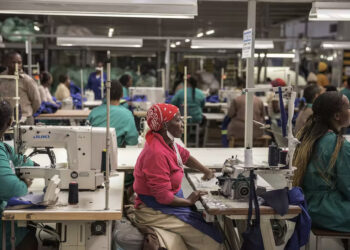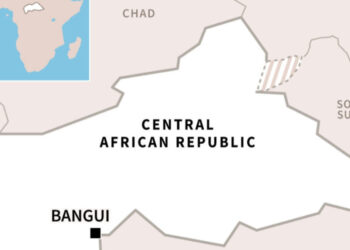As the U.S. federal government shutdown continues, furloughed employees have turned to Uber and other gig platforms to try and make ends meet. As government employee Brook Mitchell told NBCNews, “I’m looking at dog-walking, I’m looking at babysitting, I’m looking at doing any freelance gig work I can.” In Ohio, a man tweeted that his Uber driver was a federal employee, adding “he has to feed his family & pay mortgage real sad.”
Uber has become a classic example of the benefits and pitfalls of the gig economy, yet debates on it and automation tend to focus on developed countries. With the developing countries, the gig economy’s impact is more complex.
Five years after Uber launched in sub-Saharan Africa, Nairobi, Kenya’s capital, has become one of the company’s biggest markets in Africa — with 5,000 drivers as of 2016 and 1.8 million riders as of 2017. Despite past protests over wage cuts, in 2018 Uber in Nairobi expanded with UberBODA, a service that enabling riders to travel by motorcycle.
The majority of people in developing countries work in the informal sector — a section of the economy where companies are unregulated by the state and jobs unprotected by labor laws.
For instance, 77.9 percent of Kenyans work in the informal economy, which has 6 million unlicensed businesses, according to the World Bank Group. This is due to a lack of traditional private sector jobs even for educated young people. As technology evolves, informal work is becoming digital — the digital gig economy.
The World Bank Group sees the gig economy as a system in which “organizations contract with independent workers for short term engagements.” But the risks are much the same as traditional informal work: contingent pay with no health insurance or pension and unpredictable hours. In such a system, already-vulnerable workers become targets for exploitation.
Digital gig work is based on high-speed internet, which is transmitted through fiber optic cables. But for Kenya, and other African countries, that connection was a long time coming. In 2007, the Kenyan government released Vision 2030, a development plan to improve citizens quality of life and industrialize the country. The report claimed that Kenya would become “one of the top three BPO [business process off-shoring] destinations in Africa…attracting at least 5 major leading IT suppliers and at least 10 large multi-national corporations.”
“Africa’s improving connectivity gives [technology companies] access to cheap reserve army of labor (Karl Marx’s phrase),” Mohammad Amir Anwar, researcher at the Oxford Internet Institute, told The Globe Post. “In some cases, it is cheaper than India and the Philippines- rising cost of servicing clients from these two locations is making tech companies to look for cheaper alternatives. Also, having multiple locations means companies can provide round the clock services to their customers and offset some risks (political upheavals, for example).”
Kenya’s 2009 installation of a fiber optic cable was one of ten connections created that year in Eastern and Southern Africa, a project that cost $650 million dollars. Prior to this, Kenyans had relied on satellites for internet access, with slower service and higher rates. In both local and national media, Kenya’s new internet connection created high expectations for high-speed change — part of a perception that greater internet access would grow Kenya’s economy and break down “colonial barriers” for entrepreneurs.
By 2014, Kenya had 200 startups. More than 40 percent of Kenyan workers now use advanced computers requiring programming skills. Andela, a U.S. company, is training African software developers, including Kenyans, with the goal to educate 100,000 by 2024. This scene is part of the country’s budding sector of digital entrepreneurs as well as a new market for broadband subscribers, online business, and the digital gig economy.
“Kenya is the poster child (in the eyes of corporate world and media) for Africa’s increasing connectivity and digital transformation,” Anwar said. “ [A] rhetoric of Silicon Savannah emerged soon after [2009] (all hypes busted now). It is relatively stable, politically and economically, good internet infrastructure and mobile money.”
Yet Kenya and other African countries can be considered risky investments and some digital workers have found it difficult to access or attract clients in developed countries.
Moses, a Nairobi translator, told researchers at the Oxford Internet Institute the platform he used made it harder to get clients if he was honest about his location and education credentials. Moses’ story may raise questions about discrimination. Is the platform inherently discriminatory or is it clients or a combination of both? And how much of this online persona is based on work discrimination or a by-product of being online?
Moses is an example of the target worker — he is young, 26 years old, and able to work as a translator even though he did not complete college. Policy experts view digital work as a potential solution for youth unemployment, a particular problem in developing countries.
In 2015, the World Bank Group reported online outsourcing had “created new opportunities to access and compete in global job markets, from anywhere at any time, as long as they have computer and internet access.” Accessibility and convenience are parts of what is supposed to make the gig economy great.
But Moses said that “in order to be successful, “You have to create a certain identity that is not you.”
“If you want to survive online you have to do that.”
According to Anwar, “[w]hile there are hopes that a digital transformation in Africa is happening, its pace and direction is taking different trajectories than what many mainstream observers like the World Bank and media outlets have predicted. Africa’s position in the global information economy is being defined by structural barriers which forces many African economies to play a smaller role in the global information economy.”





















